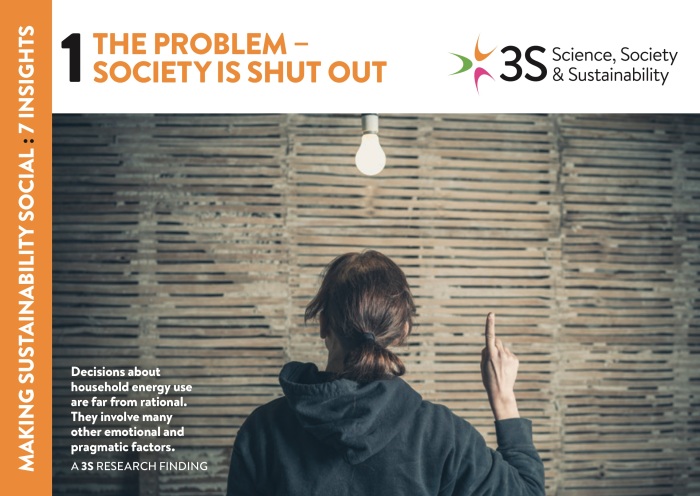
The problem: science and technology without society can’t make more sustainable ways of living
The great contemporary challenge is to make more sustainable ways of living. But the response is insufficient and doesn’t measure up to the nature and size of the problem.
Institutions create technically focussed ‘solutions’ which often don’t work in the real world. Useful voices and potential partners get excluded and the social dimensions of sustainability are overlooked.
Too much hope has been placed in science and technology to provide answers for sustainability. We see this in most high-profile sustainability policies, assessments and projects and from the sheer number of avowedly expert and technical bodies that dominate the sustainability scene.
It’s true science helps us understand environmental problems and technology provides solutions to many. But they often leave out social dimensions and societal values. And, of course, science and technology have contributed to these problems in the first place.
Many conventional decision-making tools rely on quantitative indicators and don’t take into account social dimensions. Society’s exclusion extends to ‘real-world’ innovations intended to provide new ways for societies themselves to live more sustainably.
Some examples of how society has been left out of sustainability:
3S research has shown how society gets left out of science and innovation. Knowledge produced beyond conventional sciences is often perceived as less credible than knowledge from natural and physical sciences.
Let’s take the aim of achieving a sustainable energy system. Instead of looking to civil society action or broader lifestyle changes, the challenge is framed as a technical matter of finding the right energy mix and encouraging new energy technologies. So UK policies for a low carbon energy system focus mainly on economic and technical aspects underpinned by similarly focussed academic research.
This story is repeated more widely. For example, in responses to climate change the dominant ideas and indicators come overwhelmingly from climate science. This is because the issue is ‘owned’ by the Intergovernmental Panel on Climate Change which prefers knowledge from the natural and physical sciences.
A big ambition of the Intergovernmental Platform on Biodiversity and Ecosystem Services (IPBES) was to design a new type of global expert organisation, more open to civil society. However, its ‘top-down’ design and adherence to mainstream conceptions of scientific credibility works against making the Platform more open to civil society.
Too often society is given only one option – to accept new policies and technologies.
Science itself doesn’t stand apart from society
Experts often don’t acknowledge that science and innovation themselves are social. Science is conducted by social actors and informed by social norms, values and practices. The boundaries between ‘science’ and ‘non-science’ are blurry.
Science and technology transform and shape the world but their social and ethical implications are often unspoken. These aren’t neutral apolitical activities.
Sustainable development and innovation is for the public good. So it stands to reason that without societal engagement, innovation is unlikely to be sustainable.